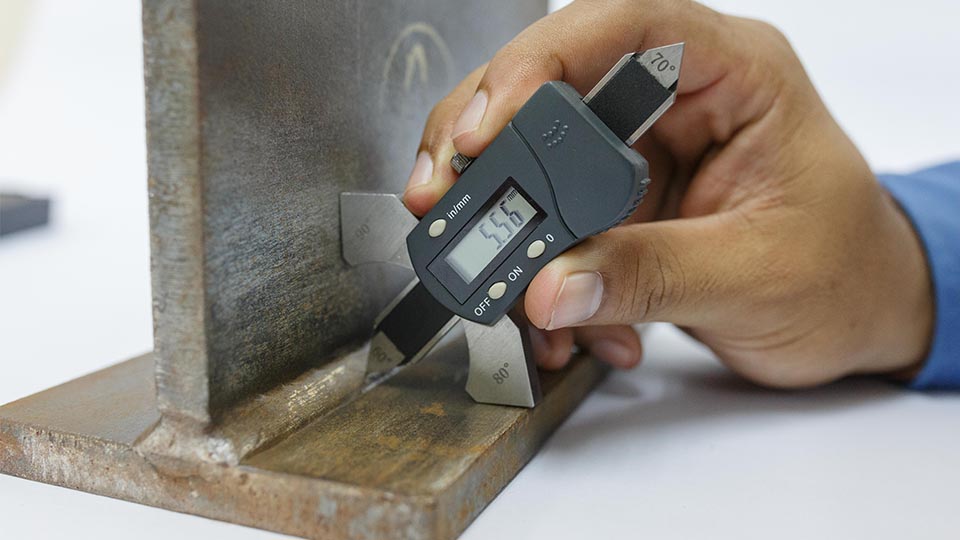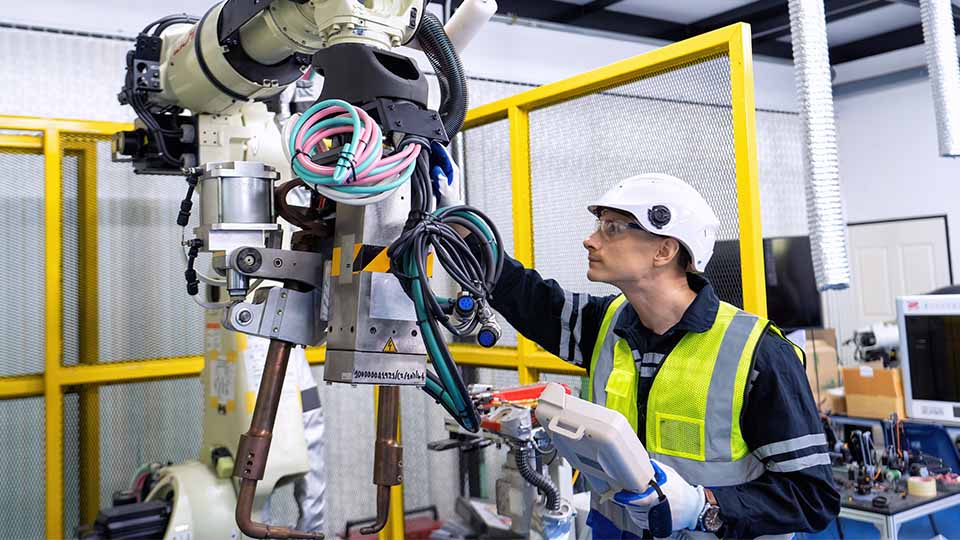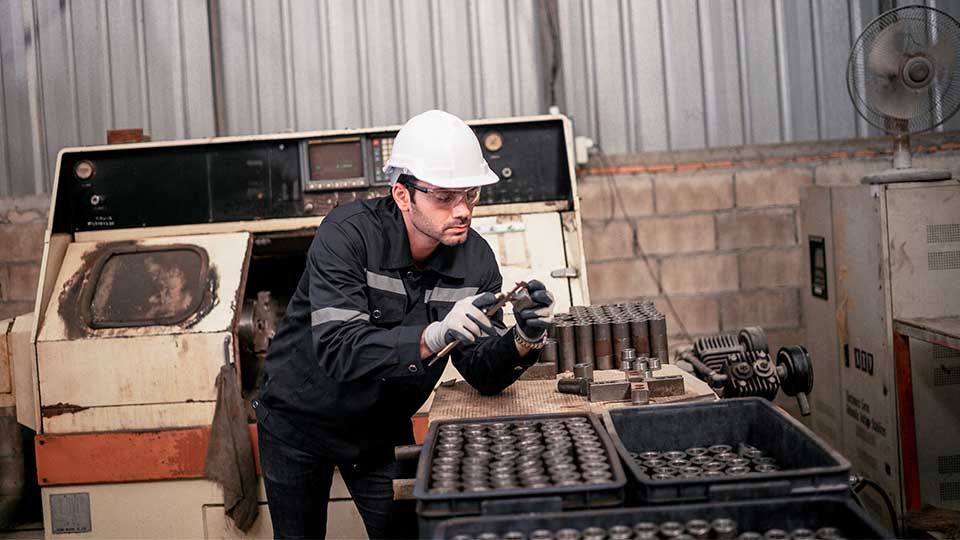Whether you are considering a career as a contract engineer or thinking about hiring a contract engineer for temporary assistance on a specific project, it is important to know what a contract engineer does. This article will discuss the types of engineers, contracting benefits, and tips for starting a contract engineering career.
Contracting or freelance contract work is a building block to a strong career foundation and is becoming very popular in many industries. It provides a lot of freedom and the flexibility of often choosing the work you do. Many engineering contractor positions have recently started to grow in demand and popularity. Some of these positions directly result from the global expansion in automation and manufacturing.

How to become a contract engineer?
- Earn your high school diploma. You will want to choose Science, Technology, Engineering, and Math (STEM) classes in High School. These will help shape your engineering foundation.
- Attend a trade school. Students can skip university for many contract engineering jobs. Trade schools can offer just as good, if not better hands-on training than university-level classes.
- Attend University. Select a degree program that has high post-graduate job placement. Make sure to identify which programs have opportunities for contract work to have many job opportunities after graduation.
- Connect with contractors, businesses, and customers. Leverage social media, co-workers, and clients to get your name into the forefront of the industry. You can also work with engineering service companies that connect contractors directly with businesses.
- Build your brand. Make sure always to be professional and supportive to co-workers or clients. The most important brand is your own, and it could be challenging to find work if you damage your reputation.
Many young engineers find contracting a great way to start their careers. It helps them to build a strong foundation because of the work experience they can gain in a short amount of time. Most engineers will only contract for 2-3 years because of the demanding hours, and travel is often required in many of these roles.
Types of Contract Engineers in the Automation Industry:
- Short-Term (1-12 months) Contract Engineers: These contractors are between engineering jobs and aren’t sure of their next career move, so they want to try contracting until they find a full-time position. They are willing to work many hours on a job to try and make a lot of money because they know this is only a temporary career choice.
- Medium Term (12-24 months) Contract Engineers: These individuals may be unsure of a specific career path, so they have decided to work on a contract to increase their professional skills, experience different facilities, or work in multiple industries before choosing to work for a specific employer.
- Long Term (>2 Years) Contract Engineers: They enjoy travel, different project experiences, and pay and want to continue working as contractors for the foreseeable future. They enjoy constantly working on new projects with new people and gaining a lot of experience while troubleshooting different tasks on every job site.

Contract Engineering Careers:
- Design Engineers: work with computer aid design (CAD) software and help create products from the concept phase to the production phase.
- Controls Engineers: are responsible for the logic and organization of automation tasks in systems or equipment.
- Electrical Engineers: configure electrical components and parts to meet specifications and requirements.
- Program Managers: can help lead a program from start to completion while ensuring the team meets financial targets and projected goals.
- Robot Programmers: they program robots to perform tasks that humans ordinarily could not do because of their size, quickness, or repetitiveness.
- Weld Engineers: Are responsible for different joining processes and ensuring they meet all joining specifications.
Career Path for a Contract Engineer:
1. Contract Employee (W2)
Many people prefer the comfort of working for a contract house. The company will take care of your expenses, provide company benefits, tell you what engineering project you will work on, and they promote your resume to new clients.
Advantages of being a W2 employee:
- Company Covered Benefits: Your employer covers these.
- Comfort Level: No need to worry about looking for contract work. When you finish a project, it is your employer’s responsibility to find the next job.
- Engineering Contract: The business signs the contract with the client, and the engineer is not involved in any documentation requirements or negotiations.
- Business Insurance: Your employer covers your insurance cost.
Disadvantages of being a W2 employee:
- Lower Hourly Rates: Your employer takes a large portion of the hourly rate, especially in the first 40hrs. The company determines your fixed hourly rate.
- You Have A Boss: You report to a manager who tells you where and when to work.
- No Flexibility: You cannot choose the engineering projects you want to work on because your boss tells you when and where to work. The company also determines your time off or vacation allowance.
- No Tax Credits: Some tax credits self-employed workers enjoy are not allowed for W2 employees.
2. Self-Employed Contract Engineer (1099)
With the proper connections in the industry and an excellent reputation, you could be on your way to financial freedom and early retirement as a self-employed contractor.
Advantages of being self-employed:
- Higher Hourly Rates: Because you work for yourself, you get paid a higher hourly rate than working for a contract house.
- Retirement Allocations: With a Simplified Employee Pension Plan (SEP IRA), you can start saving 0-25% (max. $69,000 in 2024) of your compensation compared to a 401K with a maximum allowance of $23,000 in 2024.
- Tax Credits: Turn your taxes into a tool for your self-employed business and receive more tax deductions than W2 employees.
- Be Your Own Boss: Don’t be tied down working for someone else when you could run your own business.
- Work-Life Balance: You determine what projects you want to work on and when you want to work!
- Build Your Own Brand: Showcase your talents while creating your brand, and don’t let your name and work ethic be tied to your employer.
Disadvantages of being self-employed:
- Finding Work On Your Own: Without an engineering service platform like JOINER Services, finding new clients in your industry can be challenging.
- Finding Insurance Coverage: Being self-employed, you will be responsible for finding your health and business insurance. Insurance is the most significant question mark for many people before becoming self-employed. Companies like VantagePointe Benefit Solutions are making it easier for contractors. Often, people will find that the coverage cost is nearly the same as they would have paid if they were working as a W2 employee.
- Business Accounting: You will need to track your business expenses and provide them to your accountant annually.

Contract Engineer Salary:
The salary or hourly rates for contract engineers widely vary, and it also depends on the type of engineering work that is being performed.
Contract engineers who have very technical niche skills and several years of experience can and will command a much higher salary than traditional full-time workers. They often are paid more because they are being hired for their prior work experience in an industry, and not just their technical abilities.
According to JOINER Services, the average payout for a contract engineer is around $100,000 per year. This highly depends on the length of the contract, hours worked, experience level, and engineering profession.
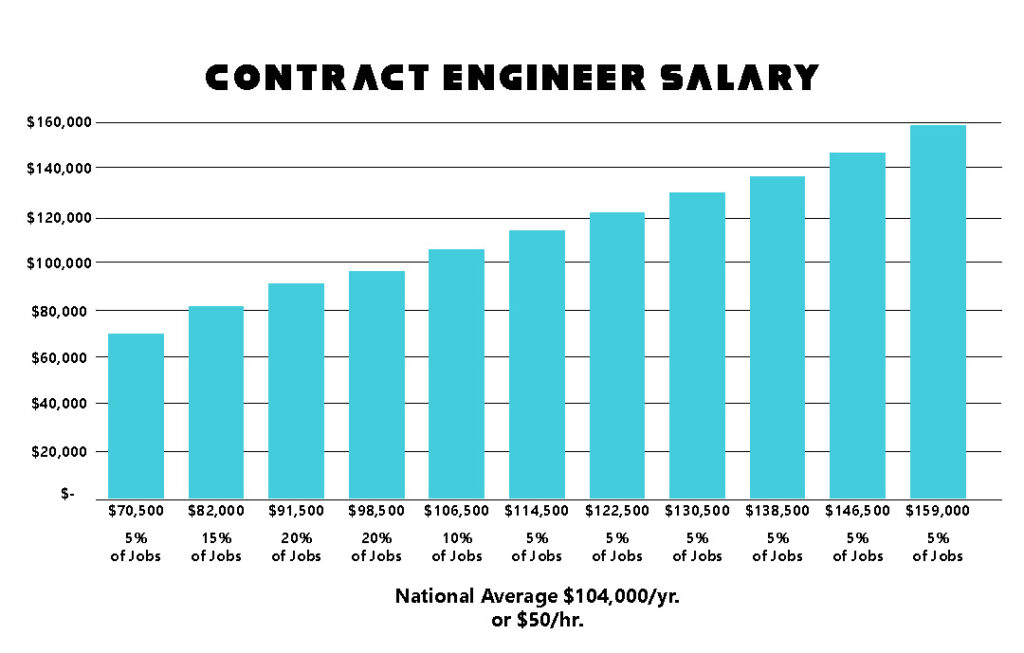
Expectations as a Contract Engineer:
Project Duration:
In contract engineering, the contract will generally state that the project will last for a specific contract term, which could be anywhere from one day up to a year or more. The complexity of a project will determine the length of time that a contractor will work for a specific client.
Many contracts will last several months, especially if the project is an installation of an assembly line or automated system. Contract engineers often work six or even seven days weekly for a client, depending on the workload and project timeline requirements. A contract worker will most likely work more than eight hours daily while on contract.
Contract engineers who worked for JOINER Services in 2023 averaged 21 weeks on their project.
Project Description:
A contract engineer is often responsible for multiple things, and each project will differ from the next. They are frequently asked to perform various engineering tasks because of the deep skill base that many contractors offer.
Each job description is different, but contract engineers are used to helping with the five main phases of a project:
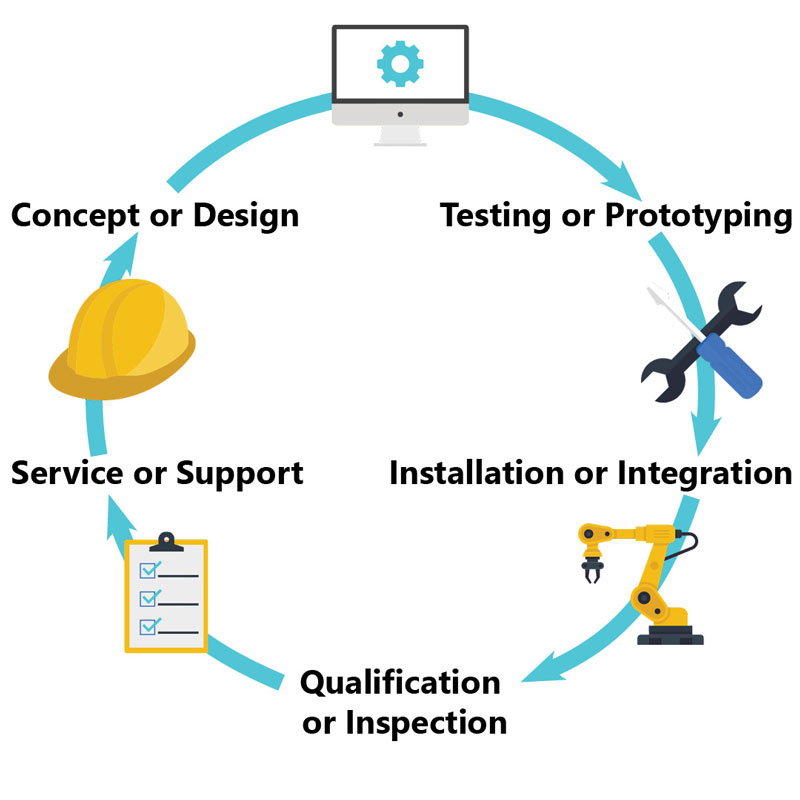
- Concept or Design – the planning and initial organization of a project where a scope is defined.
- Testing or Prototyping – the development or testing of specifications and the first build of a product.
- Installation or Integration – the installing of equipment, processes, and procedures.
- Qualification or Inspection – the review of all methods and the system validation of the equipment.
- Service or Support – ensuring the equipment, product, or processes maintain their project requirement.
Training may not necessarily be considered a phase of any project, but contract engineers need to have the ability to train the client’s maintenance and engineering staff. Engineering contractors can perform their essential skills if asked to assist a client’s workforce.
Top Contract Engineering Soft Skills:
Below, I list fourteen critical soft skills that a contract engineer must have.
- Can Network With Past Co-Workers: Being able to contact people you have worked with in the past to discuss potential problems or help troubleshoot an issue can be very beneficial.
- Communication With Others: Contract engineers must be able to articulate problems and solutions with the client while not using such advanced technical terms that the other party gets confused.
- Creative: Providing creative solutions to customer problems is a critical soft skill that contract engineers must have.
- Good Listener: Besides talking, contract engineers must be able to listen to their client’s problems to understand how to truly help them.
- Independent: A contractor must be independent as many times they are put in situations without support, and they must be able to stand alone to help lead the client.
- Knowledgeable About Their Profession: They do not need to know everything about everything but must know their specific niche skillset very well.
- Math Skills: Understanding basic mathematics is a common skill that engineers must use often, especially when calculating certain analytics or troubleshooting.
- Mechanical: Being good with your hands and having the ability to create or modify systems or equipment is a great skill to have in this industry.
- Problem-Solving: A smart contract engineer is a problem-solver as usually they are there because the client does not know or have the staff to do it themselves.
- Quick Learner: This is very important because, with new clients, contractors must learn new equipment, systems, or automation at a rapid pace in order to understand how to perform their job.
- Self-Motivated: Engineers must be self-motivated daily to learn new things and challenge normal operating procedures to push themselves and their clients to success.
- Troubleshoot Client Issues: They have to be able to fix problems. That starts with troubleshooting issues the client has and helping them prevent issues from occurring again.
- Understand the Client’s Time Constraints: Contractors must make sure the client meets their cycle time and production targets.
- Upholds Their Professionalism: A contract engineer often needs to be the “middleman” between engineering and the plant, so they must get and hold some business professionalism, whether right or wrong, in a situation. They need to earn the respect of their new co-workers and make sure everyone moves towards the same goals.
Contract to Hire as a Contract Engineer:
Another function that contract engineers perform is the evaluation of potential candidates as full-time employees for the clients. This evaluation process may be conducted while an engineer is still in the contracting stage. During this stage, the client can thoroughly review all aspects of an applicant’s qualifications before they are hired for a permanent job.
This review includes understanding facility equipment, how quickly they can troubleshoot issues, and often the most important personal characteristics, such as how well they work with others or their team members. If a contractor chooses to decline the permanent role offered by a client, they are usually retained on-site until the company can make a full-time hire.
Once a permanent employee has filled the role, the contract engineer is often used to help train the new employee. Once the new employee can perform tasks in their new role, the contractor can leave the company for their next project.
Contract Engineering Travel Requirements:
Contract engineers are often more willing to travel than full-time employees. Many times, because of the location of a project, there are not enough qualified engineers to choose from locally. Companies must bring outside contract engineering talent to their facility until engineering procurement can fill those positions. Contract engineers can spend anywhere from weeks to months on the road working for clients.
This allows these engineers to travel across the country and even the world, exposing them to new cultures and experiences. Contract engineers can spend anywhere from 5% to 100% of their time away from home working for various clients. Using contract engineers who travel to job sites comes at a higher cost for the employer and enables contractors to earn higher wages.
What are the benefits of traveling as a contract engineer?
Contract engineers usually can get travel items covered by the client. These items include:
- Airfare: Flights to the client’s location are common for anyone who has to travel more than eight hours by car.
- Rental car: Daily rental car allowance or full coverage of the rental vehicle is common for anyone who has to fly.
- Per Diem: Daily per diem is often included when traveling. This per diem costs helps cover food and living expenses.
- Hotel: If the client does not provide per diem, then expect them to cover the cost of the hotel.
- Food: If the client does not cover food per diem, then expect them to cover the cost of your food.
- Mileage: Someone who drives their own vehicle to the facility can get travel mileage. Usually, they must live more than 60 miles from the facility to get this expense covered.
- Miscellaneous Expenses: Other miscellaneous expenses could include but are not limited to baggage fees, rental car fuel, parking fees, and tolls. This could also include work supplies for the project, but ensuring you get approval for any supplies before purchasing them is always good.
It must be noted that for any expenses that a contractor wants to be reimbursed for, according to their contractual agreements, they must have receipts that match the dates. Some clients will only cover up to certain costs for various expenses, so make sure if your client is covering your hotel and food expenses, that you ask what the daily allowance should be, so you do not exceed the requested limit.
If you are a self-employed or independent engineering contractor and your client will not cover these business expenses, you can use them as tax credits when you file your annual taxes. Just make sure to save all of your receipts.

Why do companies want contract engineers?
Companies frequently look to use contract engineers to fill engineering staffing demands for hard-to-find talent. They will also use contract engineers temporarily for support roles or until a full-time employee is hired. Many companies struggle to hire experienced niche talent, so they often have to use contractors.
Integration companies prefer to use contract engineers because once the project is over, and they have met their contractual obligations with their client, they can let them go from the project. The company does not have to worry about significant labor overhead costs and can return to regular payroll when the workload is reduced.
Contract-to-hire roles also allow a company to evaluate potential full-time candidates before they are employees. This type of contract position allows companies to determine if the individual is a right fit for their team without going through an interview process. Still, they get to spend weeks, if not months, with their new co-workers before a decision to hire (or not) is made.
Why work as a contract engineer?
A career in contract engineering can be a dream job that gives people in-depth knowledge in their field of expertise and an extensive list of work experiences. There is no better way to do this than by working on temporary contract assignments with many companies.
Full-time jobs keep you doing the same thing for your employer year after year, limiting your exposure to new technologies, manufacturing equipment, and automation systems. Working as a contractor and rotating through a lot of contract engineer projects, you’ll gain a massive amount of relevant work experience that will enhance your resume. Some companies even prefer to see contract engineer jobs because it shows that you have worked with many different engineering applications and multiple companies and will have a lot of knowledge in your field.
Some companies have such a hard time finding engineering contractors that they may even do on-the-job training with you. If you have some prior experience doing something relevant to the specific job requirement, they could bring you in and train you on their internal processes.
Engineering as a contract can build a solid career foundation for young engineers or rejuvenate older engineers’ careers. No matter your age, contracting can enhance your resume with lots of valuable and wide-ranging work experiences. If you want to get more out of your career, consider joining JOINER Services and start looking for a contract engineering job today!
Contract Engineer Overview:
The field offers benefits and advantages to the engineer and the client, regardless of the industry. As may be expected, much of what a contract engineer does will depend upon the specific company, required skill set, or position. It is essential to remember that every project is different, and what is needed for a contract engineer for one company may differ from what is necessary for another.
It is best to do a job search of each company that provides and hires contract engineers and learn which positions are open and best for each individual. From the employer’s perspective, hiring a contract engineer is often the best solution to filling a temporary need, whether for a few days, weeks, or months.
Do you need a contract engineer, or are you looking to become one? Use JOINER Services as your go-to engineering service provider.
Using JOINER Services, companies can find experienced and professional engineering support for any phase of their projects. These engineers are pre-screened and will have the industry expertise any company is looking for.
The self-employed contractors who use JOINER Services can now easily find contract engineering jobs and apply for those open projects. Highlight your engineering experience to stand out from the rest by creating a professional profile and start searching for projects today!

Join today to find a contract engineer or find contract work.
FREQUENTLY ASKED QUESTIONS:
Below, I list some FAQ’s about contract engineering.


